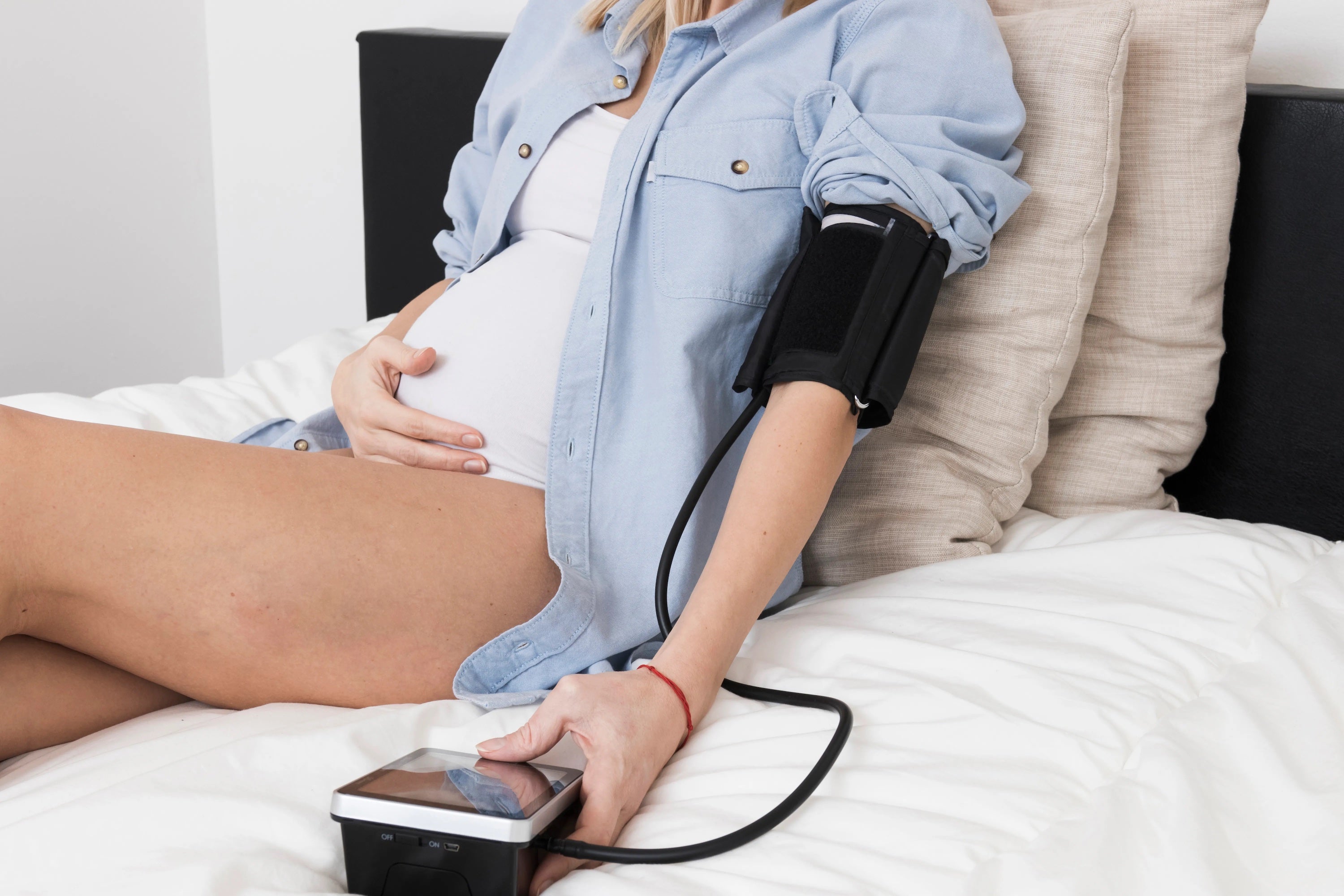Pre-eclampsia is a condition that affects some pregnant women, often in the second part of their pregnancy (from 20 weeks) or soon after a baby has been born. It can lead to serious complications for both mother and baby and so needs to be identified, monitored and treated as soon as possible.
Pre-eclampsia can range from mild to severe. Most cases present as mild (6% of pregnancies) and 2% of women can have severe symptoms.
Pre-eclampsia is a condition causing raised blood pressure (hypertension) and protein in the urine and can also lead to liver and kidney problems. You will be screened for signs of pre-eclampsia throughout your pregnancy as part of your antenatal care through your GP or midwife team – this is one of the reasons why you have a blood pressure and urine check at your antenatal appointments. The earlier the condition is diagnosed, the better the outcomes for mother and baby.
Some women may be at higher risk of pre-eclampsia. You may be at higher risk if:
- You had high blood pressure before pregnancy
- Pre-eclampsia in a previous pregnancy
- A history of diabetes, high blood pressure, kidney or autoimmune problems before pregnancy
- It is your first pregnancy
- Maternal age >40
- You are expecting more than one baby
- Your last pregnancy was more than 10 years ago
- You are obese
What are the symptoms of Pre-eclampsia?
Symptoms to look out for and tell your midwife or doctor urgently about include:
- A severe headache that won’t go away with simple pain relief
- Feeling sick or vomiting
- Changes to your vision such as blurring or flashing lights
- Swelling in the face, hands and feet
- Pain below the ribs /upper abdominal pain
- Feeling very unwell
What causes pre-eclampsia?
We don’t know exactly what causes pre-eclampsia but it is thought to be related to abnormal development of your placenta and it’s blood supply. More research is needed to fully understand the condition better.
Can I prevent it?
All women should aim to lead a healthy lifestyle and diet during their pregnancy, but there isn’t anything in particular you can do to prevent pre-eclampsia from occurring. Higher risk women may be given low dose Aspirin from 12 weeks of their pregnancy.
What are the complications?
For mum
Severe pre-eclampsia, although rare, can affect other systems in the body leading to complications. If you have severe pre-eclampsia you will be required to stay in hospital so you can be closely monitored and treated.
Fits/Seizures (eclampsia)
Severe pre-eclampsia can lead to fits, otherwise caused eclampsia. It is rare, affecting about 1 in 4000 women in the UK. Having fits when pregnant can put your baby at risk. If you have had a fit, or have severe symptoms, you will be given an anticonvulsant medication to
HELLP syndrome
This is a rare condition affecting the clotting ability of the blood and liver. It can affect several organ symptoms.
Organ damage
Severe pre-eclampsia can also affect other organs such as the brain, liver and kidneys.
For Baby
Severe pre-eclampsia can increase the risk of fetal growth restriction, premature birth and placental abruption (where the placenta separates from the wall of the womb before birth).
If left untreated, pre-eclampsia can be life-threatening for both mother and baby.
Treatment
If pre-eclampsia is suspected or diagnosed, you will be referred to the hospital for more tests, which may include blood and urine tests and ultrasounds to check on your baby’s growth and development and the placenta function.
If your symptoms are mild, you may be allowed to go home but are often asked to come into hospital for regular monitor and testing.
The only cure is the delivery of a baby, so monitoring will need to take place until the baby is born.
Severe pre-eclampsia normally requires admission for close monitoring and tests. It is normally treated with blood pressure medications and anticonvulsant medications.
The only cure for pre-eclampsia is the delivery of your baby. In mild cases, you are normally advised to have the baby around 37 weeks, or earlier if the team has concerns about the baby. This may take place by induction of labour or caesarean section. In more severe cases, you may be advised for this to occur before 37 weeks and be counselled on the risks of a premature birth.
Most women recovery fully from pre-eclampsia after the baby is born. Severe cases, whilst rare, can sometimes lead to longer term health problems. Your blood pressure will continue to be monitored in the postnatal period and you may be asked to continue blood pressure medication for several weeks.
Resources
https://action-on-pre-eclampsia.org.uk/
Disclaimer: This article is for information only and should not be used for the diagnosis or treatment of medical conditions. For The Creators has used all reasonable care in compiling the information but make no warranty as to its accuracy. Consult a doctor or other health care professional for diagnosis and treatment of medical conditions.
Header Image by Freepik
